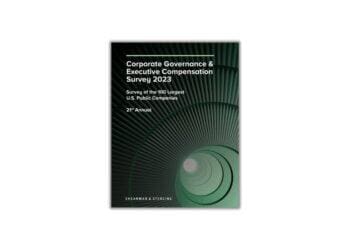Though not illegal (and rarely challenged), board interlocks at companies of all sizes now face almost certain scrutiny from an administration clearly serious about combatting market abuse and concentration of power.
In opening remarks given before the 2022 Spring Enforcers Summit, Assistant Attorney General Jonathan Kanter revealed that the DOJ’s Antitrust Division is increasing its efforts to enforce alleged violations of Section 8 of the Clayton Act, one of the pillars of U.S. antitrust law.
“For too long, our Section 8 enforcement has essentially been limited to our merger review process.” Kanter said. “We are ramping up efforts to identify violations across the broader economy, and we will not hesitate to bring Section 8 cases to break up interlocking directorates.”
This increased level of scrutiny is consistent with the current administration’s well-publicized focus on antitrust law. The White House in July 2021 issued a sweeping executive order that attempts to marshal a whole-of-government approach to “enforce the antitrust laws to combat the excessive concentration of industry, the abuses of market power, and the harmful effects of monopoly and monopsony.”
Board interlocks were not explicitly addressed in the order, but it referenced the Clayton Act on six occasions, and when viewed alongside Kanter’s recent comments, there is sufficient reason to believe that companies with interlocking boards could be investigated by antitrust enforcers for a Clayton Act Section 8 violation.
Historically, private litigation and government challenges to resolve alleged interlocks have been rare, and the usual remedy is to require the offending board member’s resignation via a settlement agreement or by petitioning the court for injunctive relief.
As one might expect, this has led to a paucity of case law on the issue.[1] When coupled with the decided lack of antitrust agency enforcement, guidance on interlocks is far less defined than the legal standards addressing merger reviews. It follows that DOJ’s stated intention of “ramping up” its Section 8 enforcement could be a source of concern for corporations, if only because the parameters of potential enforcement actions are less known.
The evolution of Section 8
Section 8 of the Clayton Act has been revisited periodically since the law’s enactment in 1914, with the latest — and perhaps most consequential — amendment occurring in 1990. It was then that Congress altered the law’s near-absolute ban on interlocks, introducing safe harbors into the legislation that exclude certain competitive overlaps.
The 1990 amendment also raised the jurisdictional threshold from $1 million to $10 million, while introducing an annual adjustment to that figure based on U.S. gross national product (GNP).[2] These changes, reformers argued, were meant to address certain disincentives in the Clayton Act to board service that discouraged qualified individuals, thus depriving private business of their talents.
The 1990 amendments contain three de minimis exceptions to the interlock ban:
- Competitive sales of either corporation are less than $1,000,000 (adjusted annually for changes in GNP —currently $4,103,400)
- Competitive sales of either corporation are less than 2 percent of that corporation’s total sales
- Competitive sales of each corporation are less than 4 percent of that corporation’s total sales.
These thresholds and exemptions only apply to horizontal interlocks that would otherwise violate Section 8.
Recent actions alleging Section 8 violations
- On April 18, 2022, True Social Equity in Cannabis, an association of consumers, workers and others in Illinois, filed a complaint in the Northern District of Illinois alleging that Akerna Corp., Green Thumb Industries Inc., ILDISP LLC, Verano Holdings Corp., and Surterra Holdings Inc. maintained illegal interlocking directorates. Although the complaint contains vague and unsupported allegations of collusion, price-fixing (via information sharing), and monopolization of the legal Illinois marijuana market, no other antitrust violations besides the Section 8 claim are alleged. In addition, rather than requesting equitable relief to remedy the alleged interlock, the complaint inexplicably seeks to prohibit the defendants from marketing, selling, licensing, distributing, and growing marijuana and a divestiture of all assets.
- In June 2021, DOJ announced that Endeavor Group executives were resigning from the Live Nation board of directors as part of a settlement of an alleged illegal interlocking directorate. This settlement is similar to other Section 8 investigations over the past decade resulting in a board resignation, such as when an executive of Google resigned from Uber’s board when the ride-sharing company announced it was pursuing self-driving vehicles, or when the Federal Trade Commission (FTC) in 2009 closed an investigation into an interlock involving Google and Apple after a common member resigned from Google’s board and Google’s CEO resigned from Apple’s board.
These examples, including private litigation and government enforcement actions, demonstrate that Section 8 concerns can weigh on both extremely large businesses in mature industries and much smaller companies in emerging industries. Market definition is usually a key issue in antitrust law, and Section 8 is no exception: A potentially illegal interlocking board under Section 8 can be triggered by middle-market business operations, depending on how competition is defined and construed.
Furthermore, the legal costs associated with antitrust litigation or government investigation can be material for middle-market businesses. When viewed from the cost-benefit perspective, it makes sense for businesses large and small to take some preventive steps to assess and mitigate the risk of any potential Section 8 claims or and enforcement actions.
Considerations for compliance programs
Given the dynamic nature of Section 8’s safe harbor provisions, company executives, particularly those in the middle market, should monitor the composition of their company’s board of directors and officers with an eye toward Section 8’s prohibitions and jurisdictional thresholds. For companies whose Section 8 compliance strategies rely on safe harbor thresholds, be sure to assess the balance sheet and relevant markets at issue.
It is important to remember that sales on the balance sheet are a backward-looking indicator. Companies evolve and change based on perceptions about the future, and that includes the development and sale of new products and services. Company executives should be alert to how new products and services could implicate new areas of competition, both in their own enterprises as well as those with which there is an interlock.
In one of the few areas of case law on Section 8 — and probably still today the most important — the Ninth Circuit in TRW, Inc., v. Federal Trade Commission (1981) held that competition can encompass more than an assessment of the cross-elasticity of demand for existing products when viewed from the context of Section 8. This has huge implications, especially for emerging industries where the bright lines of competition are blurred by product and service offerings that are rapidly evolving. As the FTC’s former director of its Bureau of Competition wrote in a 2017 blog post about TRW, “neither company [named in the complaint] perceived the range of competitive possibilities in terms as narrow as those advanced by petitioners.”
Section 8 concerns can be particularly prevalent in the transactional context. Mergers and acquisitions often entail changes in the composition of the board of directors, and these changes can create interlocks, even (perhaps especially) in minority investments where the companies involved remain independent, stand-alone entities post-transaction. Furthermore, these kinds of equity investments can trigger Section 8 concerns at various levels, depending on existing interlocks with other companies that are not parties to the deal. All of this argues strongly for Section 8 compliance to be fully incorporated at an early point into existing M&A due diligence to avoid unforeseen risks.
Conclusion
The Clayton Act’s prohibition on interlocking boards may not have been a historic focus area for a company’s compliance plan, but given the change in DOJ’s regulatory posture vis-à-vis antitrust enforcement generally — and the recent comments made by DOJ about Section 8 —the risk profile for interlocking boards could prove to be higher than many corporate executives assume, both in terms of private litigation and government investigations.
References
[1] “Inter(Lock)down: The Need for Stricter Enforcement of Section 8 of the Clayton Act,” by Shafkat Rakib, Cardozo Law Review, Vol. 41, 2020: “A small number of Section 8 cases have been filed since 1914, and of those filed cases, only a handful have reached a decision on the merits.”
[2] “[T]he 2022 thresholds under Section 8 of the [Clayton] Act that trigger prohibitions on certain interlocking memberships on corporate boards of directors are $41,034,000 for Section 8(a)(l ) and $4,103,400 for Section 8(a)(2)(A).” Read more.



 Wendy Arends
Wendy Arends  Mark Tobey
Mark Tobey  Julia Banegas
Julia Banegas 








